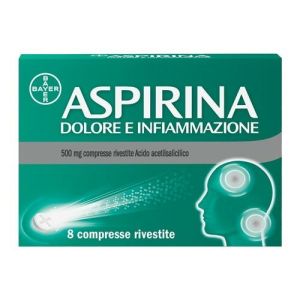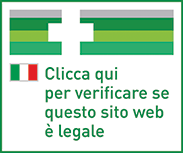Ship in Europe, Find out rates!

Aspirin Pain And Inflammation 500 Mg Acetylsalicylic Acid 8 Tablets
BAYER
Coated tablets based on Acetylsalicylic Acid.
Therapeutic indications
Aspirin Pain And Inflammation Tablets are used for the symptomatic treatment of fever and / or mild to moderate pain, such as headache, flu syndrome, toothache, muscle aches.
Dosage and Posology
Aspirin Pain And Inflammation should be taken with the following doses:
- Adults and children (16 years and older): the recommended single dose is 1 tablet, which can be taken again if necessary after at least 4 hours have elapsed. In case of more intense fever or pain, the dosage is 2 tablets, which can be taken again if necessary after at least 4 hours have elapsed. The total daily dosage should not exceed 6 tablets.
- Elderly (65 years and older): The recommended single dose is 1 tablet, which can be taken again if needed after at least 4 hours have elapsed. The total daily dosage should not exceed 4 tablets.
- Patients with abnormal liver or kidney function, or circulatory problems (e.g. with heart failure or major bleeding events): ask your doctor or pharmacist for advice.
- Children and young people under the age of 16: Do not use the medicine without a prescription.
Do not take this medicine for more than 3 days (in case of fever) or 3-4 days (in case of pain) unless your doctor tells you otherwise.
Overdose
During treatment, you may experience ringing in the ears, a feeling of hearing loss, headache, dizziness - these are typical signs of overdose. If you suspect an overdose of this product, stop the treatment and contact your doctor immediately.
Contraindications
Aspirin Pain And Inflammation Tablets are contraindicated in case of:
- Hypersensitivity to acetylsalicylic acid or other salicylates, or to any of the excipients
- History of asthma or hypersensitivity reactions (e.g. urticaria, angioedema, severe rhinitis, shock) induced by the administration of salicylates or substances with similar action, particularly non-steroidal anti-inflammatory drugs (NSAIDs)
- Peptic ulcer in active phase,
- Hemorrhagic diathesis,
- Severe renal insufficiency,
- Severe hepatic insufficiency,
- Uncontrolled severe heart failure,
- Concomitant administration of methotrexate in doses greater than 20 mg per week, per dose
- anti-inflammatory of acetylsalicylic acid, or for analgesic or antipyretic doses
- Concomitant administration of oral anticoagulants for anti-inflammatory doses of acetylsalicylic acid, or for analgesic or antipyretic doses and in patients with a history of gastroduodenal ulcers
- From the beginning of the 6th month of pregnancy (beyond the 24th week of amenorrhea)
- Children and teenagers under 16 years of age.
Side effects
Like all medicines, this medicine can cause side effects, although not everybody gets them. Frequencies: not known: frequency cannot be estimated from the available data.
These side effects are all very serious and you may need urgent medical attention or hospitalization. Tell your doctor right away or go to the nearest hospital if you notice any of the following symptoms:
- bleeding (bleeding from the nose or gums, red spots under the skin)
- allergic reactions such as rash, asthma attack or swelling of the face accompanied by difficulty in breathing.
- headache, dizziness, feeling of hearing loss, tinnitus (ringing in the ears) which are usually signs of overdose
- cerebral hemorrhage
- stomach ache
- gastrointestinal bleeding. These occur more frequently when high doses are taken.
- Elevation of liver enzymes usually reversible on discontinuation of treatment, impairment of liver function (particularly liver cells)
- Hives, skin reactions
- Reye's syndrome (change in consciousness or abnormal behavior, or vomiting) in children with viral diseases and taking acetylsalicylic acid
Pregnancy and breastfeeding
Inhibition of prostaglandin synthesis can adversely affect pregnancy and / or embryo / fetal development. Results of epidemiological studies suggest an increased risk of miscarriage and cardiac malformation and gastroschisis after use of a prostaglandin synthesis inhibitor in early pregnancy. The absolute risk of cardiac malformations was increased from less than 1% to approximately 1.5%. It has been estimated that the risk increases with dose and duration of therapy.
In animals, administration of prostaglandin synthesis inhibitors has been shown to cause an increase in pre- and post-implantation loss and embryo-fetal mortality. In addition, an increased incidence of various malformations, including cardiovascular, has been reported in animals given prostaglandin synthesis inhibitors during the organogenetic period.
During the first and second trimester of pregnancy, acetylsalicylic acid should not be administered unless clearly needed. If drugs containing acetylsalicylic acid are used by a woman trying to become pregnant, or during the first and second trimester of pregnancy, treatment should be as short as possible and the dose as low as possible. During the third trimester of pregnancy, all prostaglandin synthesis inhibitors can expose the fetus to: cardiopulmonary toxicity (with premature closure of the arterial duct and pulmonary hypertension); renal dysfunction, which can progress to renal failure with oligohydroamnios; The use of Aspirin Pain Inflammation Tablets can expose the mother and the unborn child, at the end of pregnancy, to: possible prolongation of the bleeding time, an antiplatelet effect that can occur even at very low doses; inhibition of uterine contractions resulting in delayed or prolonged labor.
Consequently, acetylsalicylic acid is contraindicated during the third trimester of pregnancy
Aspirin Pain Inflammation Tablets is contraindicated during breastfeeding.
Special warnings
Talk to your doctor or pharmacist before taking Aspirin Pain and Inflammation:
- if you are taking other products containing acetylsalicylic acid, to avoid the risk of overdose
- if you get headaches while taking high doses of acetylsalicylic acid for a prolonged period of time, do not increase the dose but rather ask your doctor or pharmacist for advice
- if you use painkillers regularly, especially different painkillers in combination, this can lead to reduced kidney function
- if you have G6PD (glucose -6-phosphate dehydrogenase) deficiency, an inherited disease affecting red blood cells, as high doses of acetylsalicylic acid could lead to haemolysis (breakdown of red blood cells)
- if you have a previous history of stomach or intestinal ulcers, or stomach or intestinal bleeding or gastritis
- if you suffer from liver or kidney failure
- if you have asthma: the occurrence of an asthma attack in some patients may be linked to an allergic reaction to non-steroidal anti-inflammatory drugs or acetylsalicylic acid. In this case, the use of this medicine is not recommended.
- in case of heavy menstruation - if gastrointestinal bleeding occurs during treatment (bleeding from the mouth, blood in stools, dark color of stools): stop treatment and call your doctor or emergency department immediately
- if you are also taking medicines that thin the blood and prevent blood clotting (anticoagulants)
- acetylsalicylic acid increases the risk of bleeding even at low doses and even several days after taking. Tell your doctor, surgeon or anesthetist or dentist if any surgery, even a minor one, is planned
- acetylsalicylic acid changes the amount of uric acid in the blood. This must be taken into consideration if you are taking a gout medication.
- It is recommended not to take this drug while breastfeeding.
Reye's syndrome (a rare but very serious disease associated mainly with neurological and liver damage) has been observed in children with viral diseases and receiving acetylsalicylic acid. Consequently:
- in the case of a viral illness such as influenza or chicken pox, the administration of acetylsalicylic acid to a child should not take place without first consulting a doctor;
- If you experience signs of dizziness or fainting, changes in behavior or vomiting in a child who is taking acetylsalicylic acid, tell your doctor right away.
Expiry and retention
The expiry date refers to the product in intact packaging, correctly stored. Keep this medicine out of the reach and sight of children. Store at a temperature below 30 ° C.
Warning : do not use the medicine after the expiry date indicated on the package.
Composition
One Aspirin Pain and Inflammation tablet contains:
Active principles
500 mg of acetylsalicylic acid.
Excipients
Colloidal silicon dioxide, Anhydrous sodium carbonate, Coating: Carnauba wax, Hypromellose, Zinc stearate.
